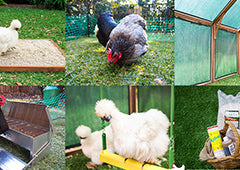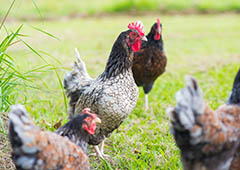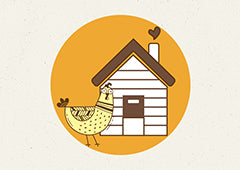Let’s get one thing straight - guinea fowl are here to stay! These curious, kooky birds are more than just a flavour of the month, and they have a real role in many backyard flocks. However, before you go rushing out in search of some chirpy keets make sure of two things: that you’re getting guinea fowl for the right reasons, and that you are able to integrate them in your flock!

Why would I get guinea fowl?
This is the easy part! There are heaps of great reasons to get some guineas:
- You want a little extra colour in your flock: Guinea fowl are simply stunning birds! If you squint, their polka-dot plumage and bouncy build make them look like walking cushions. But they’re not just colourful on the inside: guinea fowl have quirky personalities that both thrill and delight the backyard chicken keeper. Watching them putter around the yard is a treat in of itself.
- You need pest control for your garden: Your chickens like to hunt down bugs, but at the end of the day the chooks are more than happy to eat whatever comes their way, and pecking away at their treadle feeder is a lot easier than hunting down creepy crawlies. Guinea fowl, on the other hand, are full-time bug catchers. If your garden has problems with grasshoppers, ticks, roaches or caterpillars, what you really have is a guinea fowl’s buffet. Better yet, guinea fowl aren’t much for eating their greens, so they’ll eat around your precious plants! That’s what we call a wing-wing situation.
- Your chooks need additional predator protection: Guinea fowl are much larger and more fierce than your average chook. Whereas rats and snakes might risk tangling with Henny Penny, they’ll run the other way at the sight of your guineas. Foxes won’t be intimidated so easily, however, even then your guineas can be of some help: their loud, panicked calls are sure to alert you, and this can give you time to run to the rescue. They don’t call it the Guinea Fowl Alarm System for nothing!
- You want all those benefits, plus some egg-stra eggs:
Eggs are hardly the main event when it comes to guinea fowl, but if you’re barmy for bum nuts, then every little bit counts. Each guinea fowl will give you around 100, yolk-rich eggs per year.

What do I need to do to make my guinea fowl feel welcome?
While some of their ‘fowl’ reputation is unwarranted, there’s no denying that guineas can be peculiar birds. You’ll need to take steps when bringing them into your backyard.
- Raise your guinea fowl keets with your chicks Nurture can often transcend nature, especially when it comes to raising guinea fowl keets. While adult guinea fowl can sometimes be loners, or even aggressive towards your chickens, those guineas keets that are raised alongside baby chicks often end up being much better adjusted as adults.
- Give your guinea fowl a friend (or two) A guinea fowl that is all alone among a sea of chooks is very likely to stick to its lonesome - being around all those clucky girls can be a lot to handle! On the other hand, a small group of guinea fowl will integrate better with the flock, as they will feel more at home around your other birds.
- Give your guinea fowl plenty of space Left to their own devices, guinea fowl will often choose to roost outside. That’s all well and good until a hungry predator comes along. To keep your guineas safe, you’ll want to have a spacious coop, or even a separate coop to get your guinea fowl used to indoor living. They’ll need to stay cooped up for as long as two weeks before they call it home, but after that you can rest easy knowing all of your birds are safe.
Keeping guineas is not difficult, but you’ll want to make sure you’re doing it for the right reasons! If what you want is some more diversity in your flock, then why not consider some other poultry as well?

















